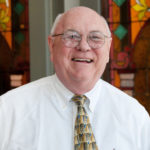
Readings:
Reading 1: Genesis 9:8-15
Responsorial Psalm: Psalm 25:4-5, 6-7, 8-9
Reading 2: 1 Peter 3:18-22
Gospel: Mark 1:12-15
Three Difficult Words
Our gospel reading today on this First Sunday of Lent ends with three difficult words: kingdom, repent, and gospel. Difficult words on the one hand because we hear them so often that we are tempted to take them for granted. Difficult words on the other hand because of the gender-exclusive meaning of “kingdom,” the rather negative connotations of “repent,” and the tendency to understand “gospel” as just a story about Jesus. But these three words — which most scholars say express Jesus’ core message, and which may have been Jesus’ exact words — are really radical and life-changing words. They are words that are truly appropriate for us as we begin the season of Lent.
First of all, Jesus proclaims the kingdom of God in a land that is occupied by the kingdom of Caesar: the Roman Empire. But this kingdom is very different from the kind of force and violence that Rome represents. Jesus is proclaiming the possibility of a new kind of world. Pope Francis has called this a “revolution of tenderness.” African American theologian Willie Jennings speaks of “revolutionary intimacy” as the message that Jesus offers. Feminist theologians and others play on the English word “kingdom” and speak about the “kindom” of God, a new family. Elizabeth Schüssler Fiorenza talks of a “discipleship of equals,” where all domination of any kind is ended. Gregory Boyle, the priest who works with gangs in East Los Angeles, speaks about a vision of “radical kinship.” Irish theologian Enda McDonough writes eloquently of the age of “flourishing in community.” A better world is possible! This is what kingdom really means.
All you have to do, says Jesus, is to accept that it is possible and begin to live in a new way. This is the point of the word “repent,” which is intimately connected with the word “believe.” Repent and believe are words that are not, in the wonderful phrase of Canadian novelist Rudy Wiebe, about feeling bad, but thinking differently. Repenting is about reimagining how the world could be, dreaming a new dream, going beyond what seems possible, thinking with people in a new way — these last two phrases connected to the Greek word for repent. To borrow the powerful words of Amanda Gorman, repentance is about being “brave enough to see” the light, “brave enough to be it.”
This, then, is the gospel. This we know as “good news.” But it is more than that. It is amazing news, incredible news, too good to be true, as Andrew Greeley once wrote. The great Sri Lankan theologian D. S. Niles once said that the good news of the gospel is like one beggar telling another beggar where to find bread. Pope Francis has written that preaching the gospel is sharing joy, pointing to beauty, and inviting people to a delicious banquet. The great Dutch theologian Edward Schillebeeckx once wrote that “being sad in Jesus’ presence” was “an existential impossibility.” Jesus, he said in another place, was like a joyful song.
These three difficult words, then, are actually wonderful words to hear as we begin this season of Lent. Lent offers us a new beginning, a chance to change our lives, a chance to change our world. In a homily he gave three years ago, about these same readings on the First Sunday of Lent, Pope Francis said that “Lent is a time of repentance, yes, but it is not a time of sorrow! It is a time of penance, but it is not a time … of mourning. It is a joyous and serious commitment to strip ourselves of our selfishness, … and to renew ourselves according to the grace of our Baptism.” Radical intimacy. New imagination!
Today’s first and second readings, along with the responsorial psalm, call to mind God’s covenant — God’s promise to be always with the world and never abandon it. Notice that the covenant referred to is the covenant with Noah, which is a covenant with all peoples, and indeed with the whole earth. The “radical kinship” that Jesus proclaims is an invitation in these days of Lent to open ourselves up to the fulfillment of that covenant which he says is “near at hand.”
It might not seem so near. We are still in the throes of COVID-19, on our way toward a half-million deaths in this country. The January 6th assault on the Capitol showed us how politically divided we are — more than perhaps we ever imagined. George Floyd’s death did the same with racism. Millions worldwide have lost their jobs and are struggling to feed their families and make ends meet. But there is new political hope, and there is the vaccine, and there is a chance to recommit ourselves to one another and to our earth once more in these days of Lent. We can do this through acts of kindness, taking pleasure in the warmth and hope of the coming spring, practicing the asceticism of really listening to one another, visiting one another in a socially distant way once we are vaccinated, praying for those we find difficult to love, or sacrificing a bit of our substance for just causes.
Another world is possible! The Kingdom! Being brave enough to see and be the light. Repent! God has not and will never abandon us. Gospel!
Rev. Steve Bevans, SVD
Louis J. Luzbetak, SVD Professor of Mission and Culture, Emeritus